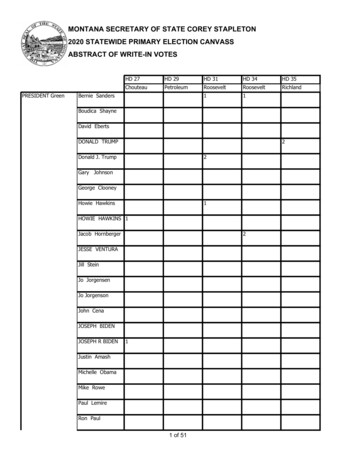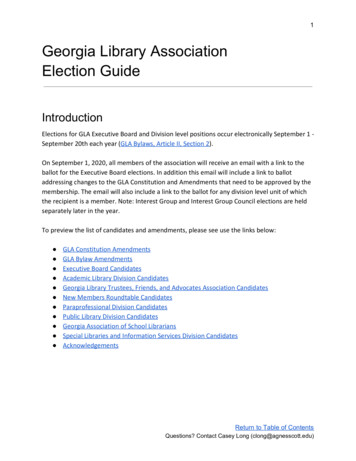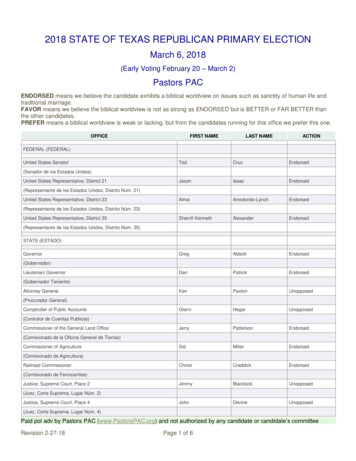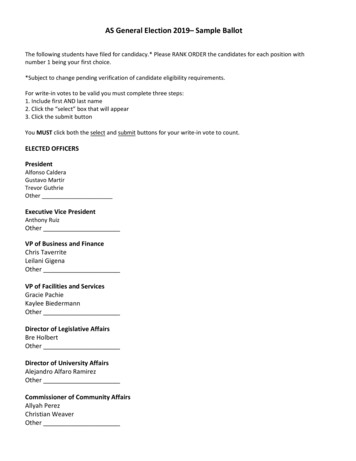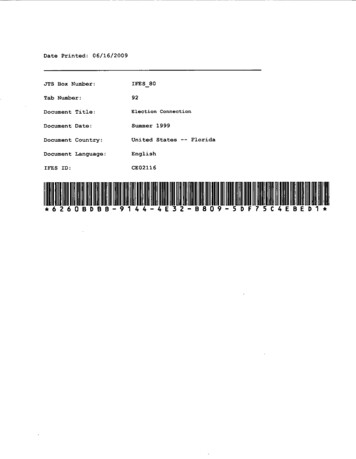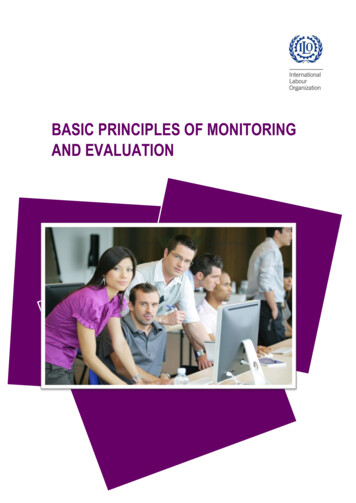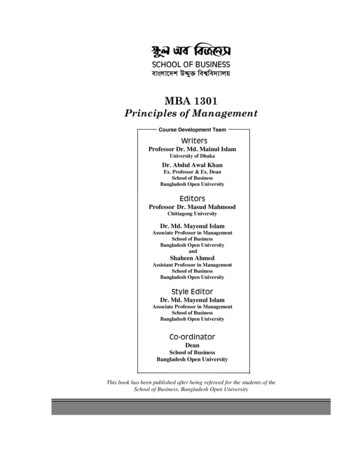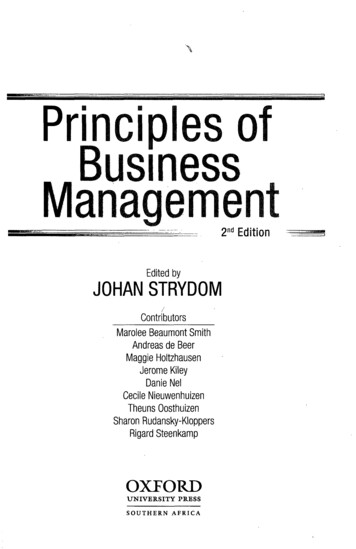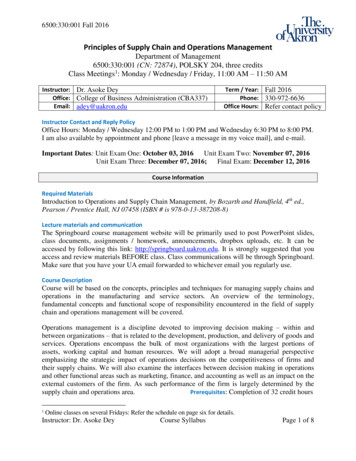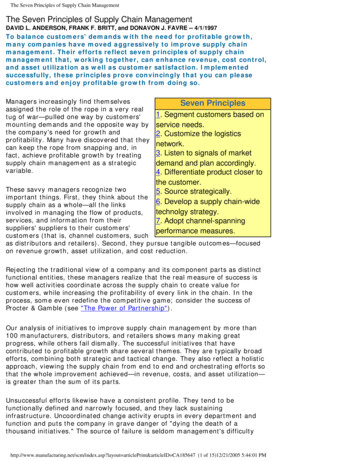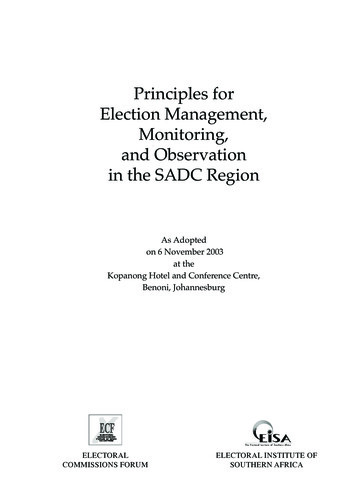
Transcription
PRINCIPLES FOR ELECTION MANAGEMENT, MONITORING & OBSERVATION IN THE SADC REGION1Principles forElection Management,Monitoring,and Observationin the SADC RegionAs Adoptedon 6 November 2003at theKopanong Hotel and Conference Centre,Benoni, JohannesburgELECTORALCOMMISSIONS FORUMELECTORAL INSTITUTE OFSOUTHERN AFRICA
2PRINCIPLES FOR ELECTION MANAGEMENT, MONITORING & OBSERVATION IN THE SADC REGIONPublished by the Electoral Institute of Southern Africa2nd Floor The Atrium 41 Stanley AvenueAuckland Park JohannesburgSouth AfricaP O Box 740Auckland Park2006South AfricaTel: 27 011 482 5495Fax: 27 0 11 482 6163e-mail: eisa@eisa.org.zawebsite: www.eisa.org.za EISA 2004ISBN: 1-919814-57-4All rights reserved. No part of this publication may bereproduced, stored in a retrieval system or transmitted in anyform or by any means, electronic, mechanical, photocopying,recording or otherwise, without the written permission of thepublisher.––––– –––––Published with the generous financial support of theEuropean Union (CWCI) and the Embassies of Belgium, Denmark,Norway and Switzerland.––––– –––––Design and layout: Sue SandrockCover photograph: Reproduced with permission ofHAMILL GALLERY OF AFRICAN ART, BOSTON, MA USAELECTORAL HANDBOOK NO 13
PRINCIPLES FOR ELECTION MANAGEMENT, MONITORING & OBSERVATION IN THE SADC REGION3ContentsPrefaceExecutive SummaryIntroductionInstitutional Context of Elections In SADC CountriesConstitutional and Legal FrameworkElectoral SystemsThe Election Management Body (EMB)Conflict Managementvi137781112Pre-Election PhaseDelimitationVoter RegistrationRegistration of Political PartiesNomination ProcessCampaign ProcessMediaUse of Public ResourcesPolitical Violence and IntimidationRole of Security ForcesPolitical Party FinanceCivic and Voter tion PhasePolling StationsSecrecy of the BallotBallots Papers, Ballot Boxes and Election ion PhaseAnnouncement of Overall ResultsAcceptance of ResultsPost-Election ReviewPost-Election 4.54.64.74.84.94.104.11
4PRINCIPLES FOR ELECTION MANAGEMENT, MONITORING & OBSERVATION IN THE SADC REGION78Election Monitoring and ObservationConclusionAppendix 1: Task Team MembersAppendix 2: AbbreviationsAppendix 3: List of Participants3034353637
PRINCIPLES FOR ELECTION MANAGEMENT, MONITORING & OBSERVATION IN THE SADC REGIONEssential elements of representative democracy include, interalia, respect for human rights and fundamental freedoms,access to and the exercise of power in accordance with therule of law, the holding of periodic, free and fair elections basedon secret balloting and universal franchise as an expressionof the sovereignty of the people, the pluralistic system ofpolitical parties and organisations, and the separation ofpowers and independence of the branches of government.Draft African Union Declaration on Elections, Democracy andGovernance, Article 320 February 2003Electoral observation and monitoring has become an integralpart of the democratic and electoral processes in Africa.International, regional and national observers have come toplay important roles in enhancing the transparency andcredibility of elections and democratic governance in Africaand the acceptance of election results throughout thecontinent. Election observation and monitoring missions canalso play key roles in diminishing conflicts before, during andafter elections.The African Union, Guidelines for African Union Electoral Observationand Monitoring Missions20 February 20025
6PRINCIPLES FOR ELECTION MANAGEMENT, MONITORING & OBSERVATION IN THE SADC REGIONPrefaceOn behalf of our respective organisations, the Electoral Commission’s Forum of SADCCountries (ECF) and the Electoral Institute of Southern Africa (EISA), we are glad topresent to you this document on “Principles for Election Management, Monitoringand Observation in the SADC Region” (PEMMO).This PEMMO document is a culmination of three years of hard work and involved agreat deal of research and consultation in the region. It was adopted at a regionalconference held in Johannesburg, South Africa on 6 November 2003 under the auspicesof both our organisations where more than 100 electoral stakeholders from SADC werepresent. These participants came from all the 14 SADC countries and representedElectoral Management Bodies (EMBs) and leading civil society organisations (CSOs)for whom election observation is a core activity. As practitioners in the field of elections,both EMBs and CSOs have grappled with the demanding task of ensuring the deliveryof credible, free and legitimate elections in their respective countries in the absence of astandard tool with which they could measure their success or otherwise.ECF and EISA are proud to have developed these guidelines for running a professionaland legitimate election. In addition, these election principles will serve as benchmarkson the basis of which the observation, monitoring and assessment of elections in theSADC region will be based from 2004 and beyond. They cover the whole period before,during and after the poll. PEMMO also provides guidelines on the conduct observersduring the electoral process. It is anticipated that, beyond election management,monitoring and observation, the PEMMO will inform and inspire post-election reviewsand election reforms in all the countries in the SADC region.The production of PEMMO is yet another significant step in the region’s democratisationprocess. Let us all commit ourselves to striving towards meeting the principlesrecommended in this document and our region can only benefit from it. Our gratitudegoes to all the representatives of EMBs and CSOs who took part in the process and tomembers of the Task Team charged with the responsibility of consulting widely anddrafting the initial version of the document.We hope that the PEMMO will be useful beyond the SADC region and that organisationsand individuals from other parts of the African Continent will adapt it to their owncircumstances.Mr Victor L. TonchiPresident: Electoral Commissions Forumof SADC CountriesChairman: Electoral Commission of NamibiaMr. Denis K. KadimaExecutive DirectorElectoral Institute ofSouthern Africa
PRINCIPLES FOR ELECTION MANAGEMENT, MONITORING & OBSERVATION IN THE SADC REGION11Executive SummaryPrinciples for Election Management, Monitoring and Observation in the SADCregion is the product of an initiative that originated at a Southern AfricanElectoral Forum Conference held from 11-14 June 2000 in Windhoek,Namibia. The Forum drew together more than 100 participants fromgovernments, electoral commissions, political parties, civil society andresearch institutions and electoral and political experts from the SADCregion. These stakeholders exchanged views about the determinants ofbest electoral practice, especially those issues related to improving electionmanagement, monitoring and observation, and enhancing thetransparency of the electoral process.The aim of the conference, whose theme was In Pursuit of Electoral Normsand Standards, was to define a set of criteria to guide electoral practice andto foster a sound enabling environment in which elections can take place.The Forum underlined the need for the development of what was thenreferred to as regional norms and standards, to provide benchmarks fornational discussions and to offer a guide to ‘best electoral managementpractice’.The Forum recommended that a Task Team of six to eight experts reflectiveof the diversity of the participants be established. The Task Team was toconsult widely in the region to develop further the framework for electionstandards identified during the Forum, assess regional experience, andhighlight best practice for the entrenchment and deepening of democracy.At the conclusion of the Task Team’s work a draft document was producedand presented to a conference of SADC electoral stakeholders, whoexamined it, further enriched it and adopted it unanimously.This final document reflects the outcome of the process and underlinesthe need to have a sound political, constitutional and legal dispensation
2PRINCIPLES FOR ELECTION MANAGEMENT, MONITORING & OBSERVATION IN THE SADC REGIONthat supports free and fair, credible and legitimate elections as aprecondition for democratic election management.The document is structured in such a way as to reflect the chronology ofevents in the management of elections. It begins by discussing therequirements for a sound political and constitutional dispensation thatwill give birth to an election regime and its supporting electoral institutions.It then looks at the three stages of the electoral process – the pre-election(preparatory) phase, the election phase and the post-election phase. Thesethree phases are all equally important to the procedures and processesnecessary to deliver free and fair, credible and legitimate elections in aclimate of peace and stability. Specific regional trends and challenges areidentified for all three phases and recommendations made for best practicein the management of elections. Because they cut across all the phases,election monitoring and observation are treated separately and areincluded in the document before the conclusion.The recommended principles address the following major issues: the need for a comprehensive constitutional and legal framework; the importance of transparent and accessible pre-electionprocedures (including the delimitation process, voter registrationand candidate nomination); the equitable use of the media and public resources and issues ofpolitical party finance; the organisation and management of the election phase, includingthe location of polling stations, their layout, and access to them;the secrecy of the ballot, and the counting process; the post-election phase, including the settlement of electiondisputes and ways of ensuring that results are acceptable; the requirements for unhindered, credible, professional andimpartial monitoring and observation of the electoral process.
PRINCIPLES FOR ELECTION MANAGEMENT, MONITORING & OBSERVATION IN THE SADC REGION32IntroductionSouthern Africa has made significant progress in the past decade ininstitutionalising democracy. This is reflected in a number ofdevelopments in SADC countries including the holding of successfulmulti-party elections in several of them in the past ten years. There isevidence of increased popular participation in governance, and dialoguebetween governments and stakeholders has taken root. Democraticinstitutions have been set up and a number of major constitutional, legaland administrative changes have been undertaken with the objective ofconsolidating and deepening democracy.Regional structures have also been established to support such a process.These include the SADC Electoral Commissions Forum (ECF), theElectoral Institute of Southern Africa (EISA), the SADC Electoral SupportNetwork (ESN) and the SADC Parliamentary Forum. These organisationshave committed themselves to supporting the growth and deepening ofdemocracy in the sub-region. In pursuit of these aims election observersare sent to monitor and observe elections in the region, training isprovided for election personnel and a number of other activities areundertaken.Notwithstanding these achievements, major challenges remain. Thereare pockets of conflict in several countries in the region and there havebeen situations in which election results have not been acceptable to allparties involved, resulting, on occasion, in violence and instability. Evenin some countries where there is a certain level of acceptance of electionresults, elements of discontent can be discerned after elections.Thus, a major challenge is the need to secure the integrity of the electoralprocess by adopting people-oriented voting procedures and facilities as
4PRINCIPLES FOR ELECTION MANAGEMENT, MONITORING & OBSERVATION IN THE SADC REGIONwell as establishing a culture of peace and tolerance. Alternative disputeresolution mechanisms focused specifically on election–related conflictneed to be established to complement existing legal provisions.Experience in the region and beyond has shown that deepening democracyentails more than holding periodic elections and creating a set ofinstitutions. It also involves developing a generally accepted set of valuesthat ensures fair electoral practice predicated on representation,accountability, inclusiveness, transparency, gender equality, tolerance andrespect for diversity. These basic values have been agreed upon by theSADC countries and are expressed in the various declarations andinstruments to which they are signatories: the Harare Declaration of 1991,the Windhoek Declaration on the Freedom of the Media (1991), the SADCTreaty of 1992 and the 1997 SADC Declaration on Gender andDevelopment. In 2001, SADC leaders identified as part of their commonagenda the promotion of common systems and political and other sharedvalues transmitted through institutions that are democratic, legitimate andeffective; as well as the consolidation and maintenance of democracy, peaceand security. This led, among other things, to the adoption by SADCmember states in 2002 of a Regional Indicative Strategic Development Plan(RISDP).Although they are an important expression of political will, commitmentto these instruments alone does not necessarily translate into ‘best’democratic practice, which is a critical element of democracy. Accordingly,there is a need for a common definition and a common understanding ofwhat constitutes ‘best’ democratic practice. This can only be reachedthrough a process of dialogue between the major stakeholders in theelectoral process and by learning from experience.In an attempt to address this, a number of initiatives have been undertakenat global, regional and national levels. For example, the CommonwealthSecretariat produced a working doc
4.2 Voter Registration 15 4.3 Registration of Political Parties 16 4.4 Nomination Process 17 4.5 Campaign Process 18 4.6 Media 18 4.7 Use of Public Resources 19 4.8 Political Violence and Intimidation 19 4.9 Role of Security Forces 20 4.10 Political Party Finance 21 4.11 Civic and Voter Education 21 5 Election Phase 23 5.1 Polling Stations 23 5.2 Secrecy of the Ballot 24 5.3 Ballots Papers .
